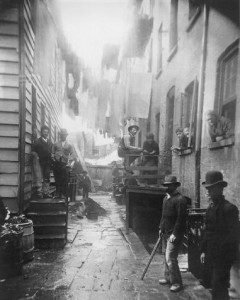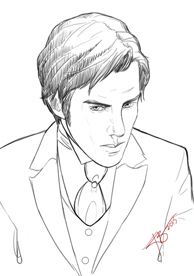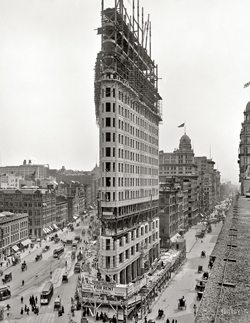Over the past fortnight, I have provided my responses to the NY Public Library Reader’s Den discussion points for The Alienist’s Part I: Perception and Part II: Association. This week’s Part III: Will discussion points were perhaps the trickiest of all, especially for me as a non-New Yorker, but I’ll still give them a shot.
Regarding Kreizler’s final insight on the killer, what do you, dear readers, feel about this?
You can read the final insight the question refers to here. My mind is immediately drawn to what is probably my favourite passage in the entire novel, found all the way back in Chapter One:
The country, [Kreizler] declared tonight, really hasn’t changed much since 1896 … We’re all still running, according to Kreizler — in our private moments we Americans are running just as fast and fearfully as we were then, running away from the darkness we know to lie behind so many apparently tranquil household doors, away from the nightmares that continue to be injected into children’s skulls by people whom Nature tells them they should love and trust, running ever faster and in ever greater numbers toward those potions, powders, priests, and philosophies that promise to obliterate such fears and nightmares, and ask in return only slavish devotion.
In my view, The Alienist and The Angel of Darkness are as much a commentary on today’s society as they are on society of the 1890s, so it should come as no surprise to any regular visitor of 17th Street that I wholeheartedly agree with the above passage and final insight regarding the killer, and believe they are just as applicable now as they were for the time period in which the books are set. Although we’ve come a long way in many respects, in others we’re as blind as we’ve ever been — perhaps worse, in some ways, with the escapism certain technologies have provided along with the band-aid solutions certain drugs have provided. But that’s a topic for another day.
What about the contrasts in the lives of New York’s lower class denizens and those of Kreizler’s team members?
 The beauty of the team’s composition in my view is that Mr. Carr appears to have made a point of including characters like Stevie Taggert who, prior to being taken under the protection of the doctor, very much fell into the “lower class denizen” bracket. I think that’s what I appreciate so much about The Angel of Darkness as well. Not only does the sequel provide us with a contrasting murderer, a contrasting developmental context for the murderer, and a contrast between city and country that we didn’t get (to the same degree) in The Alienist; it also provides us with a contrasting narrator in Stevie Taggert. As much as The Angel of Darkness captures the same city as The Alienist, we see many aspects of New York in a totally different light thanks to Stevie’s vastly different life experiences brought about by his early life on the street.
The beauty of the team’s composition in my view is that Mr. Carr appears to have made a point of including characters like Stevie Taggert who, prior to being taken under the protection of the doctor, very much fell into the “lower class denizen” bracket. I think that’s what I appreciate so much about The Angel of Darkness as well. Not only does the sequel provide us with a contrasting murderer, a contrasting developmental context for the murderer, and a contrast between city and country that we didn’t get (to the same degree) in The Alienist; it also provides us with a contrasting narrator in Stevie Taggert. As much as The Angel of Darkness captures the same city as The Alienist, we see many aspects of New York in a totally different light thanks to Stevie’s vastly different life experiences brought about by his early life on the street.
Does this contrast still resonate, especially in light of the recent mayoral campaign?
As for whether the class contrast still resonates, I’ll leave that one up to New Yorkers to answer. The only thing I will say, being from overseas, is that a comment on the recent New York Times Big City Book Club chat about Jacob Riis’ How The Other Half Lives struck me: “The HALF is now the ONE PERCENT. Looks like we need to review our arithmetic…” If that really is the case, I wonder how it might influence a third Alienist book, assuming Mr. Carr does decide to write one. Will it affect the parallels New Yorkers could draw from the book? Will it affect how Mr. Carr would choose to write the book? Mr. Carr certainly hasn’t been shy in expressing his opinions on the new class divides (or lack thereof) in the city in recent months.
How about the political and law enforcement structures of 19th century New York? They seem more concerned with keeping the immigrant population in check than with actually solving the crime and conditions that makes it so restive.
Corruption — it’s a universal theme that pervades the novel. This was an era when Tammany ruled New York; when police captains were rewarded with transfers to the most lucrative graft precincts in the city, thereby ensuring the protection of brothel and dive owners provided they could continue making the required payoffs; when agents for reformers were found guilty of blackmailing the same individuals they were supposedly trying to clean up; when the largest slum landlord in New York was the Episcopal Church; and when the Catholic Church relied on the donations of thousands of immigrants barely surviving in the crowded tenements of New York. Where money and power is concerned, I think the Paul Kelly of the novel said it best: “It’s a sucker bet, a crooked game, whatever you want to call it, and there’s a part of me that just wouldn’t mind seeing it go the other way for a little while.” Although, obviously, I don’t quite agree with Kelly’s methods!
Do you think Carr did well in making the doctor more relatable and sympathetic as a person? What about the others? We never really delve further into the characters of the Isaacson brothers … Perhaps in Carr’s sequel?
I believe that I’ve adequately explained my view on Kreizler’s portrayal in my responses for Part II. I absolutely agree that further background for the Isaacson brothers would be fascinating, though. Other than the tidbit we were told about the brothers being drawn to detective work after reading Wilkie Collins as boys, we know very little of their individual or shared motivations and background. My fingers are crossed that such an explanation will be provided to us one day in a third book.
Final brainteaser: What location is this and where does it figure into the book?
The image the brainteaser refers to in the blog post a little unclear, but I’ll suggest the Croton Reservoir. And for anyone who doesn’t know where that particular structure figures into the book… well, you’ll just have to keep reading!
Thanks to the NY Public Library Reader’s Den for the interesting discussion points this month! It’s been fun.


